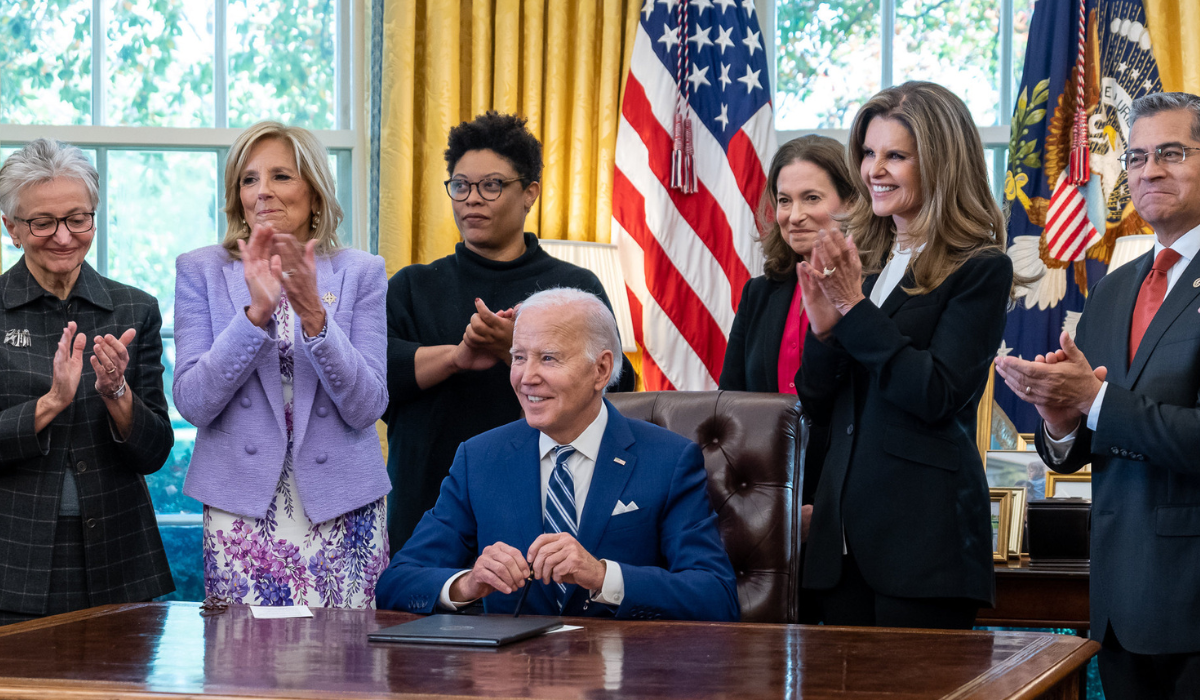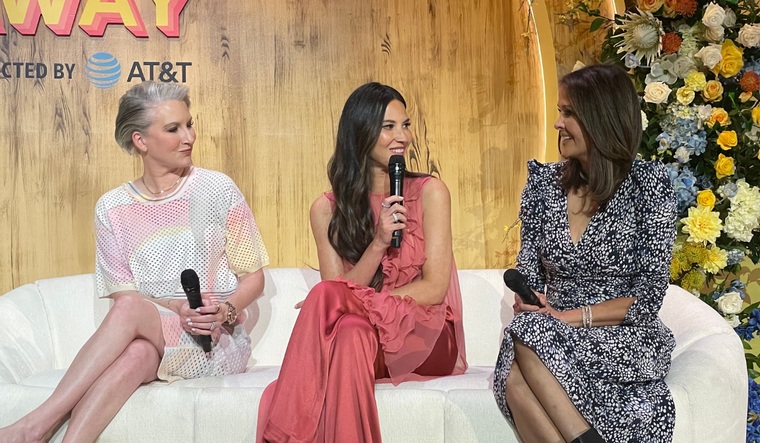First Lady Dr. Jill Biden and Maria Launched a Women’s Health Research Initiative This Week—and Maria’s Giving Us an Inside Look
On Monday, the Biden administration made a major announcement: A groundbreaking initiative to improve how the federal government funds research on women’s health. And as President Biden signed the presidential memorandum establishing this initiative, Maria Shriver stood next to him thinking, I can’t believe this is actually happening.
“I thought of all the people who’ve talked to me over the last 20 years about the disparities in health research—all of the people who’ve said to me, ‘You’ve got to do something. You’ve got to help. You’ve got to get this done,’” says Shriver. “I was always like, ‘You’re right. I do have to do something.’ Parity in women’s health research was one of those things that seemed very attainable, and yet simultaneously out of reach. Watching the president sign that memorandum was truly amazing.”
For more on this historic initiative, what it means for women around the world, and why it’s prompting Maria to be more hopeful than ever before about the future of women’s health, read on.
A CONVERSATION WITH MARIA SHRIVER
Maria, this women’s health research initiative is a big deal. What does it mean to you?
This initiative is a historic moment and cause for celebration. It’s a very big deal—the first-ever White House initiative on women’s health research in this country’s history. Think about that for a moment. Women make up half the population, and yet just 10 percent of the National Institute of Health’s research budget is dedicated to women’s health issues. From this moment on, women’s health research will come out from obscurity and be elevated to its rightful place on the national health agenda.
I have been working as a women’s health advocate for more than 20 years. For decades, I and other women’s health advocates have been asking for equity when it comes to investing in women’s health research. Now, thanks to President Biden and Dr. Jill Biden, we will finally address the issue of how sick women are in this country and how women can age most successfully into the future.
The statistics on how women disproportionately suffer from certain diseases are shocking…
We cannot answer the question of how to treat women medically if we do not have the answers only research can provide.
Why are two out of three people who develop Alzheimer’s women?
Why are two thirds of the cases of multiple sclerosis women?
Why do women make up 90 percent of lupus patients, 80 percent of all autoimmune disease patients, and 85 percent of migraine sufferers?
Why are black and brown women two to three times more likely to die of pregnancy-related complications than white women?
We need answers to these questions and so many more. The fact is that right now, women do not have the answers they deserve. We can’t treat women or prevent them from being sick in the first place if we have not invested in funding the necessary research. With this White House Initiative, that changes at last.
When did it become obvious to you that women are under-studied in health research?
When I founded the Women’s Alzheimer’s Movement (WAM), I wanted to understand why women are at the epicenter of Alzheimer’s disease. Yet when I asked why women deal with cognitive decline in much higher numbers than men, I was met with, “Well we don’t know—but we also know very little about what happens to women in midlife.”
I have tackled many of the issues related to inequities in funding women’s health in my roles as a journalist, First Lady of California, a daughter of Alzheimer’s, and the founder of WAM. As I travel around the country, it has become glaring to me how desperate women are—as are their doctors!—for more research in all areas of health, especially during midlife and beyond. So many millions of women feel uncared for, unheard, and unseen.
We are an aging country, and doctors don’t have the information they need to treat women in their 50s, 60s, 70s and beyond. That’s largely because doctors don’t have the research data that can dictate their care.
We need research that will keep women healthy enough to continue thriving in their multiple roles—providing, partnering, caregiving, parenting. Women need to be healthy to fulfill all these roles. Because when we are healthy, our families benefit, the community benefits, the economy benefits, and most importantly, women ourselves benefit.
What are the next steps when it comes to this White House Initiative on women’s health research?
This initiative is a game-changer. Throughout the next 45 days, members of the Initiative will recommend concrete actions that the Biden administration can take to improve how research on women’s health is conducted and invest more in women’s health research. We will set priorities—recommending areas of focus where investments could be transformative in areas of research ranging from women’s brain and heart health to menopause.
What excites you most about the potential impact of this Initiative? What’s your hope for the future of women’s health?
I hope this initiative will add hundreds of millions of dollars to women’s health research. If scientists can get money from the NIH to study women’s health, they will. Historically, we haven’t funded women’s health-focused research. With money there for it now, the hope is that researchers will look at things like menopause, endometriosis, osteoporosis, birth control, aging, and so many other important health issues that are currently lacking in data.
I hope it ignites the private sector as well. There are a lot of wealthy people who can come together to focus their giving pledge on bring women’s health up to parity.
When I go to the doctor’s office and ask about research on women my age, I’m almost always met with this response: “We don’t know.”
I believe my daughter’s health care journeys will be drastically different than mine.
Please note that we may receive affiliate commissions from the sales of linked products.




